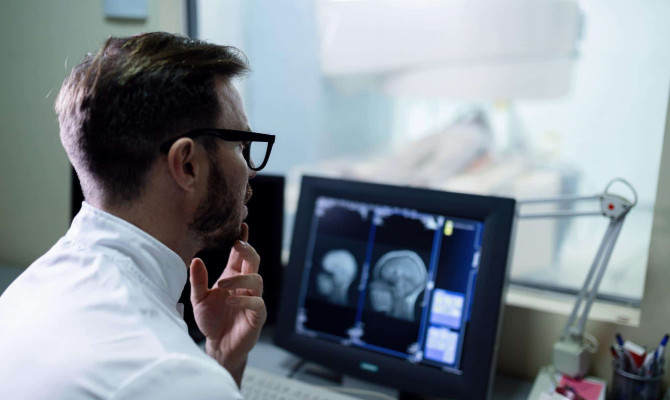Kidney cancer: Causes, Symptoms, and Treatment

- Kidney Cancer
- 17 Aug 2023
Overview
What is Kidney cancer?
Kidney cancer is the aberrant and uncontrolled growth of kidney cells. It also known as renal cancer are not very uncommon, they are among the 10 most common cancers around the world. Nearly 4 lakh people are diagnosed with renal cancer, Accounting around 2% of all cancer diagnosis and fatalities. These cancer are found in all age groups but most commonly seen in early life. Kidney cancer can be benign or malignant 1Overview| Researched based study from Nlm.nih.gov

About kidneys
- Every person has two kidneys, which are positioned on each side of the spine above the waist. Each of these is a brownish- bean-shaped organ. It is roughly the size of a tiny fist.
- Impurities, excess minerals and salts, and excessive water which is not required by the body are removed from the blood by the renal system.
- Every day, our kidneys filter around 180 liters of blood in order to produce 2 liters of urine. Hormones produced by the kidneys help control blood pressure, red blood cell formation, and other biological activities.
Prevalence
- Nearly 4 lakh people are diagnosed with renal cancer worldwide on which male constitute about 2.5 lakhs and females about 1.5 lakhs. RCC is the deadliest urological tumor. 12% 5-year survival rate at the late stage. Nearly 1.75 lakh people perished due to renal cancer of which male constitute about 1,10 and female about 65 thousand
Types
Types of Kidney cancer
Benign cancer
- It include Angiomas and adenomas
Malignant Kidney cancer
It includes types that are based on the appearances on the biopsy and cell of origin like:
Clear cell cancer
- It is most common among all subtypes and accounts for majority of deaths in renal cancer
Papillary renal cell cancer
- It is most commonly associated with patients on dialysis.
Chromophobe renal cell cancer
- It is another uncommon malignancy that can cause indolent cancer which are uncertain to spread but are lethal if they do. Clinical trials are being conducted to determine the most effective treatments for this type of tumor.
Medullary renal cell cancers
- It is a rare subtype, which is most commonly seen in patients with sickle cell traits.
Collecting duct / Bellini duct cells cancer
- Collecting duct Cancer is more likely to occur in people between the ages of twenty and thirty years. It starts in the kidney’s collecting ducts. Long-term treatment of this malignancy is challenging, even with a combination of systemic radiation therapy and surgery.
- It is the least common and carries worst prognosis .
A specific kind of kidney cancer
- Wilm’s tumor is most common renal malignancy in childhood
- Occurs in the age of 2-5 years. Wilm’s tumor is most common renal malignancy in childhood
- Child with born abnormalities like horse shoe kidney, undescended testis, having urethral opening in the abnormal locations etc. Child born with WAGR syndrome, Beckwith-Wiedemann syndrome are having additional risk then the normal born child
Symptoms
Symptoms of Kidney cancer
It usually has a triad of symptoms like:
- Passing blood in urine can be the first visible symptom seen by the patient called hematuria.
- Pain in the flanks and any unusual swelling in the abdomen which is painful on touch.
- Loss of weight and Anemia (decreased hemoglobin in the blood cells).
Risk factors
Risk factors for developing Kidney cancer
Risk factors of developing renal cancer are:
- Modifiable Risk factors
- Non modifiable risk factors
Modifiable risk factors
Increased blood pressure
- Preventing and treating hypertension may reduce the risk of kidney Cancer, in addition to the established benefits of hypertension control for heart disease, overall health and stroke prevention 3Risk factors| Researched based study from Nlm.nih.gov
Increased body mass index
- Obesity is the most common modifiable risk factor in almost all cancers, which can easily be managed with daily exercises, having a healthy lifestyle and balanced diet.
Smoking
- Carcinogens present in the cigarette go to the kidney with blood for purification ending up causing renal cancers on a long run.
Occupational risk factors include
- Industrial exposure to chemicals, rubbers and asbestos which on chronic exposure is not only a risk factor for renal cancer but is also a major risk factor in skin cancers. So routine screening is very essential for factory workers.
- Other factors associated with renal cancer include chronic kidney disease, patients on hemodialysis.2Risk factors| Researched based study from Cancer.org ,3Risk factors| Researched based study from Nlm.nih.gov
Non-Modifiable risk factors
Age
- The mean age of onset for individuals with renal cancer is 64 years, with a lot of cases being identified in the age range of 65 to 74 years. The frequency of renal cell Cancer is relatively low among individuals below the age of 45.
- Wilm’s tumor occurs in the pediatric age group.
Gender
- Compared to women, men have a twofold increased risk of contracting the condition.
Genetic predisposition/ Race
- Higher incidence rates and lower survival rates were identified among Blacks.
Diagnosis
Diagnosis of Kidney cancer
Historically, renal cell cancer was diagnosed in advanced stages because of its location which is in the posterior aspect of the body, thanks to the evolving medical sciences and its invention leading to the development of radiological interventions which are like ultrasound, CT scan 4Diagnosis| Researched based study from Nhs.uk or MRI.
Most of the renal cancer are diagnosed incidentally when a patient is sent for evaluation of his non specific complaints.
The tests required for diagnosis of renal cancer include:
Blood tests
- Blood investigations along with Renal Function Tests
- Urine examination for sugar, protein, red blood cells.
Imaging test
- USG scan of both kidneys.
- CT KUB ( Kidney, ureters and Bladder) with contrast dye. The scan’s goal is to capture images from various angles of the urinary tract and surrounding organs, which includes the area between the superior poles of the kidneys and the pelvis.5Diagnosis| Researched based study from Cancer.gov
- MRI to look for extension of the disease.
Biopsy
- Biopsy can now be utilized to determine benign neoplasms that were previously surgically resected inadvertently.
- Biopsy may be useful in classifying some small kidney cancer as indolent, allowing a careful waiting strategy to be explored in some patients.6Diagnosis| Researched based study from Nlm.nih.gov
Immunohistochemistry
- More extensive and precise IHC performance, in conjunction with proper antibody selection and each focused interpretation, is required for an increasing number of enormous subtypes of renal epithelial cancer.
PET Scan
- A thorough body scan will be useful in determining whether or not kidney cancer is expanding and how well it is responding to therapy in confirmed cases.
- Bone scan for bony metastasis
Even with such advances 30% presents with advanced metastatic disease which means the disease before getting diagnosed is already spread to surrounding structures of the kidney
Stages
Stages of Kidney cancer
Survival is directly dependent on the stage of the disease
- Stage I: Disease confined to kidney 5-year survival of approximately 90% 7Stages| Researched based study from Nlm.nih.gov
- Stage II/III:Regional disease (local lymph node involvement) 5 year survival of approximately 70%
- Stage IV: 5 year survival of only 12%
Treatment
Treatment of Kidney cancer
Management of renal cancer has evolved very significantly over the year.(8) Earlier, renal cell Cancer was a surgical disease and patients diagnosed with renal cancer usually underwent removal of the affected kidney (total nephrectomy)
Suitability of treatment
Nowadays there is an array of treatment modalities according to the type and stage of the tumor which will be known by a taking a chunk of patients kidney called biopsy and examined thoroughly.
- Small cancer <2 cms require strict surveillance and should undergo screening every 6 monthly
- Cancer of size 2-3 cms are candidates for cryoablation
- Where rapid freezing up to 20% and gradual thawing is done, usually preferred in patients with multiple comorbidities
- Cancer >3cms surgery is the mainstay of management
Surgeries for kidney cancer
Partial nephrectomy
- Part of the kidney is removed and functional part is kept in the body
Simple nephrectomy
- Whole kidney is removed
Radical nephrectomy
- Both the kidneys with surrounding tissues like adrenal glands and lymph nodes are removed
Renal arterial embolization
- The feeding vessel of the kidney is blocked which end up causing shrinkage of the kidney and the cancer cells to grow by avoiding them the essential requirements fulfilled by the blood
Following nephrectomy the other kidney takes up the function, when both kidneys are non functioning the patient has to undergo dialysis a procedure where machine works like a kidney to purify blood by removing waste products.
Kidney transplant
- A kidney transplant is also an option available but finding a suitable donor is a tough task.
Adjuvant therapy
- Following oncological surgeries most of the tumor cells are removed but still few cell remain in the body with a high chance of causing recurrence hence radiotherapists usually provide chemotherapy or radiotherapy to kill the remnant cancerous cells, this therapy is known as adjuvant therapy
Radiation therapy
- Radiation therapy is a type of cancer therapy that employs high-energy x-rays or other types of irradiation to either kill or prevent cancer cells from developing.
Chemotherapy
- Chemotherapy is a cancer treatment that employs medications to halt the proliferation of cancer cells, either by killing them or preventing them from growing.
- Chemotherapy medications enter into the circulatory system and can reach malignant cells throughout the body when administered orally or injected into a blood vessel or muscle.
Other treatment modalities include
- Immunotherapy through immunomodulators who increase immunity
- Monoclonal antibodies
- Targeted therapies
- VEGF( vasoedothelial growth factor receptor) inhibitors like Sunitinib, pazopanib
- mTOR (mammalian target of rapamycin) inhibitors like Everolimus or temsirolimus
Complications
Complications
Metastasis
- One may be worried how fast does kidney cancer spread, it usually depends on the subtypes of renal cancer, clear cell type has high potential of spreading to other parts compared to its counterparts Cancer can spread through surrounding tissues, blood or lymph channels The metastatic tumor is the same type of cancer as the primary tumor.
- If renal cell cancer spreads to the brain, the cancer cells in the brain are actually cancerous renal cells. These are secondary renal cell cancer, not brain cancer.
Prevention

Prevention of Kidney cancer
The cause of kidney cancer is unknown in many cases. In other circumstances (such as inherited illnesses), even though the cause is recognized, the condition may not be avoidable. However, there are certain steps you may do to lower your risk of contracting this disease.5Prevention| Researched based study from Cancer.gov
Quit smoking
- Smoking tobacco products are responsible for a substantial proportion of instances, thus smoking cessation reduces the risk of RCC progressively, with a more than twice drop in risk after 10 years.8Prevention| Researched based study from Cancer.org
Weight management
- Obesity and hypertension are also risk factors for renal cell Cancer.
- Maintaining a healthy weight through exercise and eating a diet rich in fruits and vegetables may also lower your risk of contracting this condition.
Avoid occupational hazards
- Avoiding hazardous compounds like trichloroethylene at work may also lower your chances of renal cancer
Regular exercise
- Regular exercise not only helps to maintain a normal blood pressure 9Prevention| Researched based study from Nlm.nih.gov and weight, but it may also reduce the possibility of cancer independently of the other factors indicated.
Diet
- Healthy diet also plays vital role in decreasing the incidence of renal cancers.
Outlook
The Outlook
- Renal cancer are more common in the elderly and in populations that are predisposed to the risk factors listed above.
- Industrial chemical exposure, smoking, hypertension, obesity, and genetic abnormalities are some important risk factors for kidney cancer. Pain in the abdomen, hypertension, and hematuria are triad of clinical symptoms.
- The prognosis is solely determined by the stage at which the sickness is diagnosed. Radiological studies are the gold standard for diagnosis. The main course of treatment is surgical removal of the diseased kidney. Adjuvant chemotherapy or radiation therapy may be required.
Any feedback on this article?
 This Articles content was accurate
This Articles content was accurate Very Informative Article
Very Informative Article I have a question or a comment
I have a question or a comment
 This article contains inaccurate content
This article contains inaccurate content This article was not helpful
This article was not helpful I have a question or a comment
I have a question or a comment
We appreciate your helpful feedback!
Checkout our social pages
References
-
National Library of Medicine
Renal cell carcinoma: histological classification and correlation with imaging findings | Overview
-
American Cancer Society
Kidney Cancer | Risk factors
-
National Library of Medicine
HYPERTENSION AND RISK OF RENAL CELL CARCINOMA AMONG WHITE AND BLACK AMERICANS | Risk factors
-
National Health Service
Kidney cancer | Diagnosis
-
National Cancer Institute
Renal Cell Cancer Treatment | Diagnosis | Treatment
-
National Library of Medicine
Biopsy of renal masses: when and why | Diagnosis
-
National Library of Medicine
Epidemiology of Renal Cell Carcinoma | Stages
-
American Cancer Society
Can Kidney Cancer Be Prevented? | Prevention
-
National Library of Medicine
Epidemiology of Renal Cell Carcinoma | Prevention




































